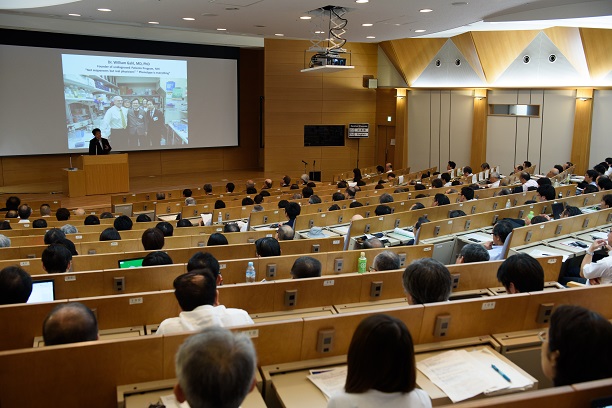Policy Alternatives Research Institute (PARI) / Policy Thinknet Symposium
GSDM 66th Platform Seminar
"New Approach for Medical R&D" Symposium Report
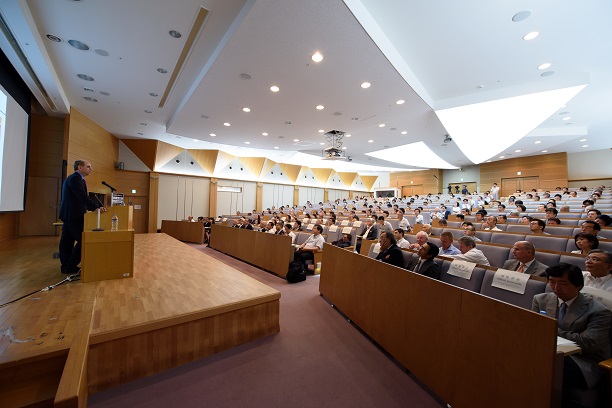
Photo: Akio Kon
| [Date] | Tuesday, August 18, 13:30-18:20 (doors opened at 13:00) |
|---|---|
| [Venue] | Tetsumon Memorial Hall, Hongo Campus of the University of Tokyo |
| [Language] | English / Japanese simultaneous interpretation |
| [Hosted by] | Policy Alternatives Research Institute (PARI) / Policy Thinknet |
| [Co-hosted by] | Global Leader Program for Social Design and Management (GSDM), the University of Tokyo / Meiji Institute for Global Affairs (MIGA) |
Find handouts and the program here: Event Details
This symposium was held to explore the possibilities of the Medical R&D and clinical research activities for realizing better medicine and healthcare based upon their societal values. By inviting leading figures on this topic from the US, Japan and European industries, academic institutions, and government agencies, we successfully discussed, with global perspectives, topics including public-private collaboration, assurance of research integrity, and speedier pathways from basic science to launches of new products or therapies. The details are as follows:
Session 1: "Japan's new initiatives"
This session, designed for recognizing Japan’s new initiatives, included four keynote speeches and a panel discussion.
Keynote Speech 1 was "AMED: Mission and perspectives" by Dr. Makoto Suematsu, the president of the Japan Agency for Medical Research and Development (AMED). Dr. Suematsu talked about AMED's goals, structure, and areas in which heavy emphasis is being placed, such as rare diseases and translational science in DNA sequences.
Keynote Speech 2 was "Translation from Basic Science to Clinical Research" by Dr. Yoichiro Matsumoto, the executive director of the Institute of Physical and Chemical Research (RIKEN). Dr. Matsumoto talked about how there are fewer clinical trials in Japan than in other leading countries, the needs for network AROs for clinical research in light of efficiency, protecting research subjects and competitiveness, and RIKEN's translational science for supporting AMED's works.
Keynote Speech 3 was "Medical R&D in University Hospital" by Dr. Ryozo Nagai, the president of Jichi Medical University and advisor of the University of Tokyo’s Policy Alternatives Research Institute (PARI). Dr. Nagai talked how about events from the past of the University of Tokyo led to the possibility of collaborative medical research between the university hospitals and industries, and also spoke of a new idea for a more workable ecosystem in medical R&D.
Keynote Speech 4 was "The Challenge about the Research and Development for Medical Innovation" by Mr. Kazuhiko Mori, the director of the Evaluation and Licensing Division of the Ministry of Health Labor and Welfare’s (MHLW) Pharmaceutical and Food Safety Bureau. Mr. Mori talked about the SAKIGAKE Designation, the Clinical Innovation Network, and the Regulatory Science Initiative, based on pharmaceutical R&D's challenge of costs for developing new drugs.
In the panel discussion, Professor Kan Suzuki of the University of Tokyo’s Graduate School of Public Policy (GrasPP) led the discussion not only with the four keynote speakers, but also with Mr. Yoshihide Esaki, director of the Healthcare Industry Division in the Ministry of Economy, Trade and Industry’s (METI) Commerce and Information Policy Bureau, and Dr. Yuzuru Matsuda, visionary leader of Health and Medicine for the Center of Innovation Stream Program in the Ministry of Education, Culture, Sports, Science and Technology (MEXT) and director of the Kato Memorial Bioscience Foundation. For promoting Japan’s new initiatives, research integrity, building human resources for medical R&D, issues related with rare diseases, collaborations under “one roof” among industry, government and academia, promoting personalized medicine were raised as important issues and some needs were found in transforming healthcare based on developing aging society, which is a global trend.
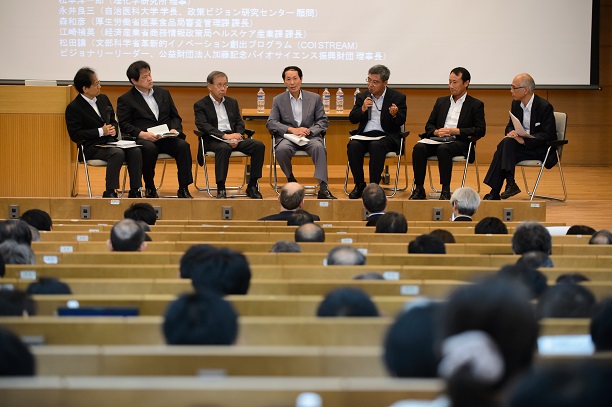
Session 2: "Global Trends regarding Clinical Research Activities"
This session was designed for catching up on new trends in clinical research with global perspectives. Three keynote speeches were followed by a panel discussion.
Keynote Speech 1 was "Innovation and the Changing Practice of Medicine" by Dr. David Epstein, the pharmaceuticals division head of Novartis AG.
Dr. Epstein talked about the need for innovation, actions by Novartis for innovation, potentials of digital technologies, and what can be done for patients.
Keynote Speech 2 was "Toward Acceleration of Open Innovation" by Mr. Masafumi Nogimori, the representative director and chairman of the board of Astellas Pharma, Inc. Mr. Nogimori talked about changes in pharmaceutical research and development, inviting open innovation by collaboratively developing pharmaceuticals among industry, government and academia.
Keynote Speech 3 was "The Frontier of R&Ds in Medical Devices" by Mr. Koji Nakao, the chairman of Terumo Corporation and chairman of the Japan Federation of Medical Devices Associations (JFMDA). Mr. Nakao talked about successful growth in global medical device markets, different business models from pharmaceuticals and human capital for medical device innovation.
During the panel discussion, Mr. Bruce Goodwin, the president of Janssen Pharmaceutical KK and vice chair of PhRMA was added to the speakers. As the moderator, Mr. Mitsuru Miyata, the editor of Nikkei BP brought up Japan's potential for clinical research in areas such as patient-centered R&D, more proper collaboration between industry and academia, and care for the elderly population. Research integrity will be one of the keys for promoting patient-centered R&D.
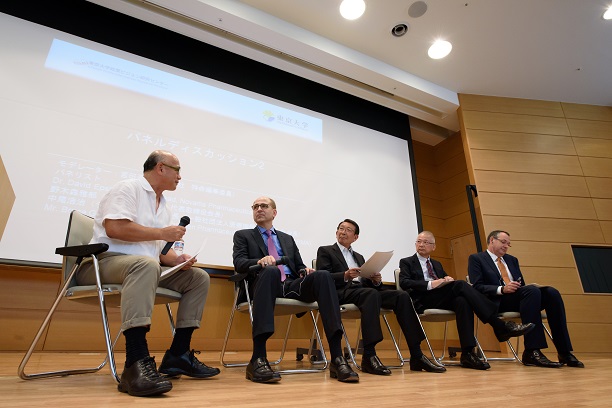
Session 3: "Conclusion and Visions"
This session hosted one keynote speech and one panel discussion as the concluding part. The Keynote Speech was "For the Future of Medical Innovation" by Mr. Toshihiko Takeda, the councilor in charge of health insurance and minister's secretariat of the Ministry of Health, Labor and Welfare (MHLW). Mr. Takeda talked about social security policy, promotion of medical research and development, and rewards for innovation in reimbursement prices as the Policy Package for medical innovation, in line with fiscal and economic policy.
The panel discussion was co-moderated by the Project Professor Akio Onishi of the University of Tokyo’s Graduate School of Public Policy (GrasPP) and Adjunct Professor Ryozo Hayashi, director of the Meiji Institute of Global Affairs (MIGA). There, needed healthcare and supporting medical R&D were found as drastically transforming in light of aging and issues related with non-communicative diseases. This trend is not only found in Japan but in other countries as well. By a global scale, we need to think about unmet medical needs, target diseases, proper budget sizes for each target, ways of performance review in medical R&D activities, and building human capacity for future R&D. This symposium is the very arena for starting a discussion on medical R&D with global perspectives.
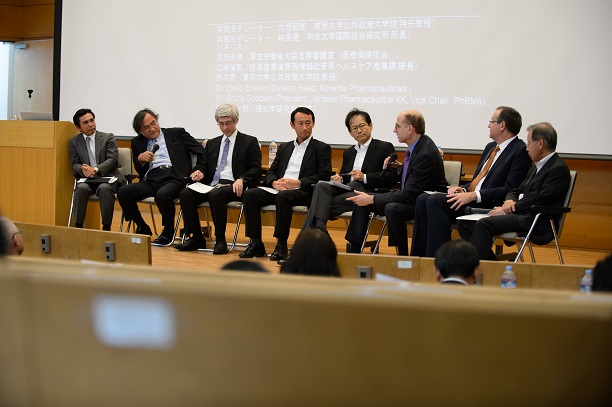
Conclusion
We found new and global trends of medical R&D to open innovation and collaborations between industry and academia. In Japan, AMED and the other stakeholders are building infrastructures for catching up on such trends with research integrity, patient-centered approaches, and global collaborations. We want to continue to discuss promoting medical R&D for a healthier future by bringing needed healthcare into practice.
